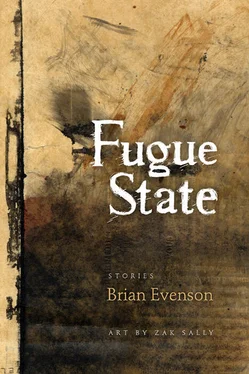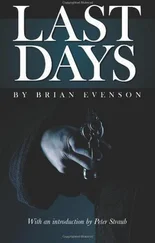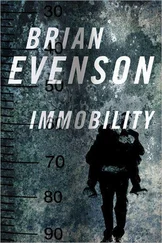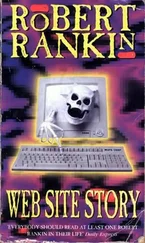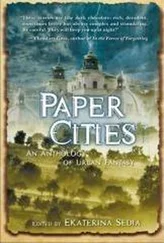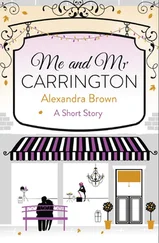The air was sharp, crisp. He could feel the prick of gravel through his socks. He picked his way carefully along the side of the house, crossed to the greenhouse.
He peered in. The greenhouse was empty. Trying the handle, he found it locked, so he pressed his shoulder to the metal edging of the door and bore down. He could see the wall and door bulge, the metal grating against the glass, the lock slipping. And then the door burst open and he was in.
He approached the simple desk, the chair. On the desk: two sheaves of paper, the one on the left higher, a pen between. He approached the leftmost, found the paper empty, blank, but of course Craven had always moved the paper from left to right.
He approached the rightmost stack, found the top sheet blank. Turning it over, he found the reverse blank as well. He leafed down through the stack but there was nothing, no words, not a mark.
When he turned he could see, through the ceiling of the greenhouse, the window of the tower. Through that window, distorted by both the glass of the window and the roof of the greenhouse, he glimpsed a figure. Perhaps Craven, he thought, Cravens, one of them. Or perhaps the cook. Don’t forget the cook. He had a feeling that everything had already occurred. The figure was looking down, he thought, looking at him.
Not knowing what else to do, he turned from the gaze, sat down at the desk. He could guess what was expected of him. Picking up the pen, he began to write.
After nearly ten months of struggling to write, he started. He continued writing uninterrupted until he again, both in prose and in life, found himself sitting in the greenhouse, pen in hand. He had, he realized, allowed himself to be used. Yet, nevertheless, I have now approached some sort of conclusion, he wrote. All that remains is for me to destroy this manuscript as well.

I.
During his tenure at Entwinkle House, Philip Kossweiller had purchased fiction that received stunning acclaim but hadn’t, to quote his boss, Vincenzo Darba, sold a good goddamn. Well, admitted the former publicity chief who insisted that everyone call him “Cinchy” and who enjoyed pronouncing himself “a boss of the people,” sure they had sold, but they hadn’t broken even. Well, sure they had broken even, but they hadn’t made much. Not enough to sneeze at anyway.
“Think blockbuster,” Cinchy told Kossweiller. “‘Every book a blockbuster’: that’s your new motto.”
“Blockbuster?”
“No,” said Cinchy, jutting himself forward conspiratorily. “Wait a minute. Blockbuster isn’t enough for us. You and me, we’re not the sort satisfied with just blockbuster. Go for the three b’s.”
“The three b’s?”
“Big-ass blockbuster.”
“That’s only two b’s.”
“Big-ass. Block. Buster. Three b’s. No more of this literature crap. Sure, it’s good, but literature’s the icing on the cake. You don’t spread icing all over an empty plate, do you? What have you got to do before you spread the icing, Karsewelder?”
“I’m afraid I don’t know what you’re talking about, Mr. Darba.”
His boss gave him a look that seemed pained, slightly constipated. “Not Mr. Darba — Cinchy. You see,” said Cinchy, throwing his hands up, “that’s your problem. You have to bake the fucking cake first.”
“What cake?”
“Go bake the fucker,” said Cinchy, boss of the people, clapping Kossweiller hard on the back and pushing him out into the hall. “God help you, Karsewelder. Bring me something that sells for a change. Blockbuster!” he yelled after him.
Back in his office, Kossweiller examined his fingernails, then tried to clean underneath them with his lower incisor. He stared at the pile of manuscripts on his desk, then went back to reading the typescript for Robert Barney’s O Fickle God, a “historical novel of the West” overladen with poorly veiled attacks on contemporary middle America. According to Barney’s agent, it was written in a “fluid, beautiful prose,” a stylistic strength that Kossweiller was having some difficulty locating. Perhaps this made it blockbuster material.
Ole Zeke, like some poor misbegotten anthropophage, leaned a pace closer to the fire and spat, his spittlegob sizzling greedily in the cackling flame.
“Seems to me,” said the old-timer [Why not ole-timer? Kossweiller wondered], “that your so-called advert-iss-ments haen’t more than a spit in the fire. Only yer middleminded are gone to ’tribute any importance to ’em.”
Big Jim nodded, half to himself. The old guy was making a curious heap of sense! Who’d have thunk he’d come to understand his own city slicker’s world through the words of a stranger in the Savage West?
He looked up to find Ole Zeke holding an open pouch toward him. “’Baccy?” the old-timer asked.
Bogged down, Kossweiller abandoned the manuscript and left his office.
Cinchy was at his desk, feet up, speaking loudly into the receiver to one of the stable of second-rate celebrities he published: an ex-president turned poet, a ’50s film star who wrote an exposé on his ’80s film-star daughter, a former TV evangelist’s wife turned blandly pseudo-Buddhist.
Farther down, Tal Anders’s door was open, Anders himself staring at his computer screen. Kossweiller went in without knocking, sat down.
“Who is it?” asked Anders, not turning.
“Me,” said Kossweiller.
“Koss,” said Anders. “I’m just on to something here. Absolutely the next big thing. Give me a minute.”
“Want me to come back?”
“No, no,” said Anders. “All I need’s a minute.”
Kossweiller stood. He went over to the nearest bookshelf, read along the spines, removed a slim handsome volume at random. The Secret Lives of Housewives. The back copy read: Not just gossip and recipes for delicious cherry pie pass from one matronly hand to another…. Here, glimpsed through keyholes, the real hidden history of housewives in all its chaleur: high romance, lesbianism, bestiality, S&M, and every depravity imaginable, and yes, even a little tenderness….
“You actually published this?” asked Kossweiller.
“Published what?”
“This.”
Anders turned slightly. “That?” he asked. “Sure. Eight printings in cloth, still going strong in paperback.”
“Is it any good?”
“Define ‘good.’”
“Is it worth reading?”
“People want it,” said Anders. “They buy it. That’s good enough for me.”
“That doesn’t answer my question.”
Anders turned. “Koss, you’re asking the wrong questions.”
“That’s what Cinchy thinks.”
“Cinchy’s absolutely right,” said Anders. “You should listen to him. Remember: he may be a boss of the people, but he’s still the boss.” He turned his attention back to the computer screen. “Just a few seconds more.”
Kossweiller sat down and stared at the back of Anders’s head.
“I mean, why did you go into editing anyway?” Kossweiller asked.
Anders shrugged. “You have to be philosophical about these matters. It’s not why you went in but how you stay in.”
“That’s cynical.”
“Philosophical, you mean,” said Anders. “Come on, Koss, lighten up.” He shook his fingers out, pushed his chair back away from the computer. “There,” he said. “Got him.”
“Got who?”
“What?” said Anders. “Only the biggest ex-KKK memoir in publishing history.”
“Off the computer?”
Читать дальше
